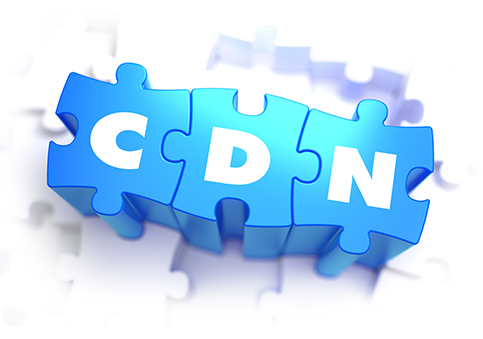Free Content Delivery Networks

The rise of a digital economy has made the Internet one vast meeting ground for businesses and consumers. Regardless of size and the products/services being offered, a digital world allows businesses to benefit from a web presence in terms of visibility, geographical reach, competitive advantage, and credibility. Content marketing has become the norm for companies trying to leverage e-commerce, but it has also resulted in an infinite supply of information aimed squarely at digitally empowered consumers. The more content your website has, the higher the traffic, which can slow down loading times.
A slow and poorly responsive website can exasperate your visitors and cause them to leave without buying anything from you. It is therefore important to make their online experience a satisfying one whenever they land on your homepage, both at home and on the go. This is why you need a content delivery network (CDN), which speeds up your website by delivering your content to users from the nearest edge server. A CDN also enhances your website security and thus protects your content against cyberattacks. Another benefit of using a CDN is that by increasing your loading times, your SEO ranking on Google is also likely to improve.
There are many content delivery network companies offering different services and plans. Some CDN services for WordPress are absolutely free forever, such as CloudFlare, Incapsula, Amazon Cloudfront, Google Cloud CDN, Microsoft Azure CDN, and Cloudinary. Others offer free trials (for example, 14 days), like MaxCDN (now StackPath), MetaCDN, CDN77, KeyCDN, and BelugaCDN (https://www.belugacdn.com). There are also CDNs that will host common scripts for free, such as Bootstrap, jQuery, and jsDeliver. You must be aware that most CDN service providers with free plans or free trial periods also have pro plans, and they include MaxCDN, Amazon Cloudfront, Google Cloud CDN, Microsoft Azure CDN, and BelugaCDN.
Choosing the Right CDN
While a free CDN may suffice for basic usage, you have the option to upgrade to a paid package that gives you more capacity and advanced features. If you decide to go for a paid CDN, here are some factors to consider:
- Performance
- Scalability
- Responsiveness
- Customer service/support
- Security
- Costs
- Performance
A content delivery network is expected to accelerate content delivery and thus the speed of your website, so the first thing you need to check is whether it has the capability to do so. Does the CDN have a high-performance network to optimize the performance of your blog, website, or e-store? Can it handle the large bandwidth demands of websites that host tons of downloadable content, or can it help eliminate video buffering and increase video stream time? - Scalability
CDNs should have the architecture to handle any amount of network traffic and process tens of gigabytes of data per second. They also must be able to deploy dedicated servers to protect your website against DDoS attacks. Lastly, a CDN should be able to adapt to your business requirements as the need arises in a timely manner; for example, in such areas such as content handling, performance optimizations, access control, failover behavior, or real-time configuration checking. - Responsiveness
A measure of good customer service is the ability to implement network-wide configuration changes as quickly as possible. Ask whether the CDN can propagate content control rules across its network or content purge requests – quickly, safely, and securely. - Customer service/support
A content delivery network service provider must be available 24/7 when requested to provide technical support, either by email or phone, and has a ticket response time of no more than a few minutes. Furthermore, the customer support representatives must have a friendly attitude and the willingness to help, show a high level of technical knowledge, and resolve issues promptly. - Security
A CDN should not only boost your website’s speed but is also expected to protect it from hackers and cybercriminals. Does the CDN have the capability to automatically block suspicious web traffic, or mitigate DDoS attacks? - Costs
Pricing is an important factor when looking for a CDN. A service provider can charge anywhere between $150 and $200 a month for a bandwidth of 2,500 gigabytes. Make a list of CDNs and compare their plans to determine which one will accelerate your website at the best price.
Conclusion
A website that loads fast leads to lower bounce rates and higher retention rates, which in turn can increase your revenue. Walmart, Amazon, Firefox, Yahoo, and AutoAnything.com are just some of the companies that have seen a dramatic increase in sales and/or traffic after reducing their website load times. You can have a similar experience by implementing a CDN strategy. With BelugaCDN (https://www.belugacdn.com), for instance, your content will be delivered 20-40% faster to the user, on any device, thanks to its IPv4/IPv6 dual-stack network. It also has the tools to provide real-time, up-to-the-second analytics of your web traffic, instant and unlimited cache purging, secure token and other security features to mitigate DDoS attacks, a dev-friendly control panel via Restful API, custom SSL, and responsive technical support. All these for $20 a month (based on 2,500 GB traffic) – 1/4 the cost of other content delivery networks such as Amazon Cloudfront, Google Cloud, Microsoft Azure, and MaxCDN.
All About HTTPS CDN, SSL/TLS CDN
Content Delivery Network In Wordpress
Power-up your Content Delivery
30 Day Free Trial Cancel Anytime